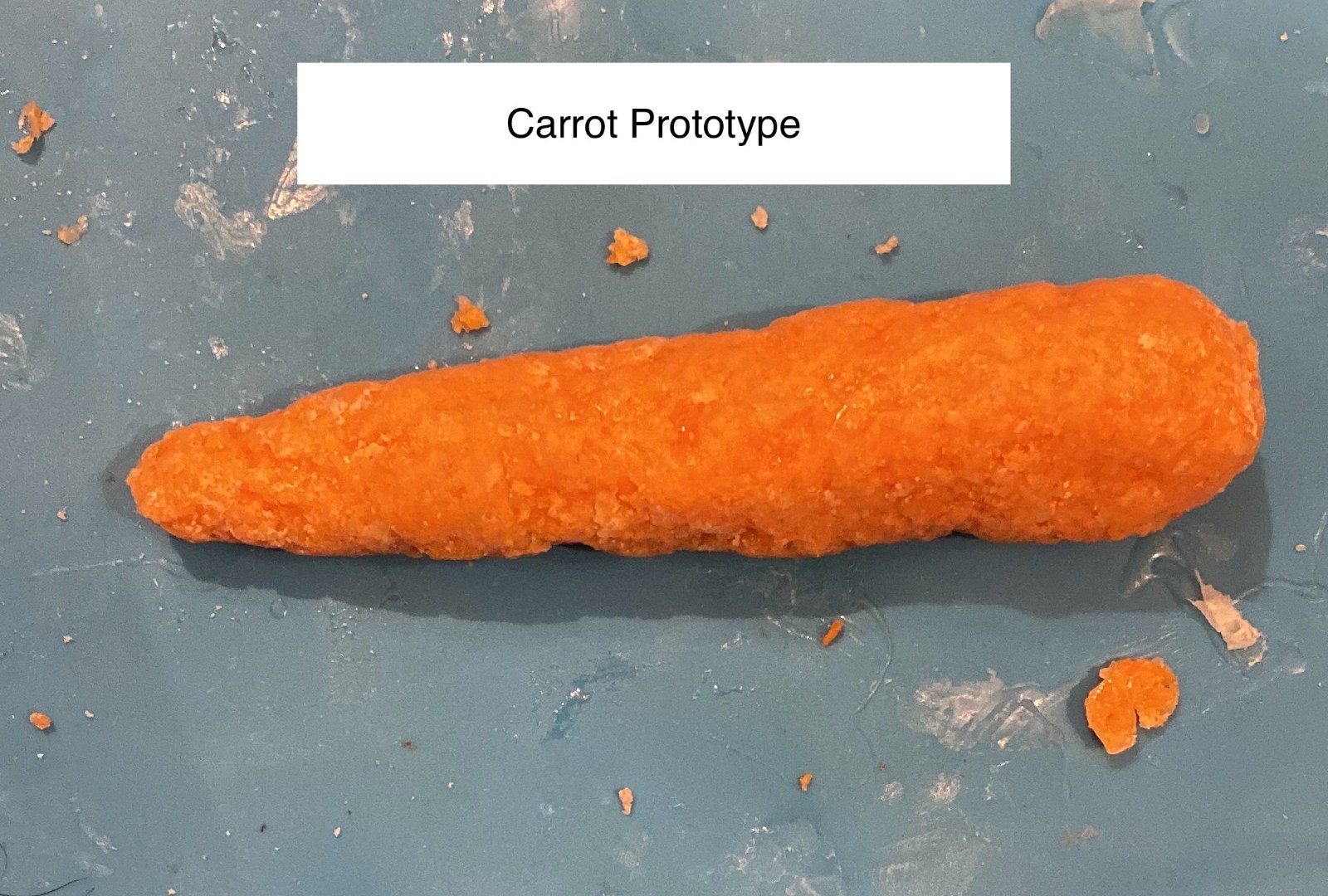- cross-posted to:
- 3dprinting@lemmy.world
- technology@lemmy.ml
- cross-posted to:
- 3dprinting@lemmy.world
- technology@lemmy.ml
Why would I want my lab-grown carrots to be carrot shaped exactly? As someone who eats quite a lot of carrots, I’d rather have my lab-grown carrots be rectangular-prism shaped for easy stacking.
Good luck inserting a rectangular-prism up your butthole.
Spoken like someone who clearly hasn’t been practicing. Get gud.
“Sounds like a skill issue”
It goes in the square hole
Wombats have joined the chat.
I don’t need luck, I’m a professional.
Fits 3d printed ass just fine.
No need to cut them up, just pop out sticks.
I’d say a sense of continuity and familiarity. It’d be weird if you’re suddenly told to eat a cube that can fulfill all of your nutritional needs when you’ve been eating foods of variable shapes for so long.
As someone who has diced, julienned, and sliced thousands of pounds of carrots, let me assure you that most people are not eating carrot shaped carrots.
What, you don’t painstakingly carve mini carrots out of every carrot for dinner? /s
We can make fractal carrot structures with the 3d printing
I will eat the nutri-cube and I will like it. I am proud that we’re finally entering the sci-fi era of this dystopia
My vast disappointment for the conspicuous lack of jetpacks cannot be salved save by a home nutri-cube dispenser.
I have literally fantasized about the “food cube” that fills nutrional needs for a meal! “What do you want to eat?” will be a question of the past! All you choose to consume is the B̷̛̛̰̮̥͕͓̺̔̽̉̽̃̾ͅã̸̛͍̌̓̊̓̊̆̈́͐̕͝͝r̶̢̺͍̺͓̖͐̂
Soylent or Joylent or whatever is around now isn’t good enough for you? ;P
Soylent green?
We’ve had nutri-cubes for a long time now. These are actually pretty good, IMO.
Look how happy this man is with his government mandated nutrition cube:

You will not ask for any other nutrition. Thank you fellow citizen, this makes me very happy

I like the yellow ones.
Squarerots ™
Cutting them changes their flavor. They’re not as good when you cut them.
That makes zero sense.
…it’s absolutely true, though. Carrots are so much better eaten wholeThey do oxidize a bit when you cut them. They just don’t turn brown like apples and potatoes. It makes them more bitter.
Different parts of the carrot taste different. The “core” tastes different to the outer part. So by cutting it up you often change the ratio between those two tastes
And better packing capabilities. Takes less room, fits more in a box = saving on transportation.
IIRC, freight companies tend to charge based on weight rather than size. That’s why designs for square liquid bottles have never taken off.
Easier dicing too
I would like onion shaped carrots, please
So Chunks from Starfield pretty much?
I want huge bugs bunny carrots
pringles shaped carrots mmmm
I feel like it would actually just be easier to make vertical growing factories for vegetables than do the same thing but worse by still growing the material, and then making them vegetable shaped.
Like, those cells will require the same nutrients and same growing conditions, and they naturally 3D print themselves into the shape of themselves.
Like, those cells will require the same nutrients and same growing conditions, and they naturally 3D print themselves into the shape of themselves.
They’ll also naturally use the nutrients and energy to 3D print stuff that’s not useful to humans, like leaves, roots, flowers, etc. Basically this is how vat grown vegetables, meat, etc, can potentially be more efficient than the typical approach.
Do we need to be more efficient? We have the resources to feed everyone on Earth and have leftovers we just aren’t allocating it correctly.
We could also increase efficiency even further by reducing meat/dairy consumption. Lab grown stuff feels like an over-engineered tech bro solution to a societal problem
Do we need to be more efficient?
I mean, it’s usually a beneficial thing. Using less resources (including land) to produce the same amount of food is probably going to mean less environmental damage. In the case of switching to vat grown meat it also means not torturing billions of animals every year.
We have the resources to feed everyone on Earth and have leftovers
Sure. No one starves because the food just isn’t on this planet, they starve because the people who have it won’t give it to them. That said, we’re also not using resources very sustainably so saying we produce enough food currently isn’t the same as saying we can continue this way.
We could also increase efficiency even further by reducing meat/dairy consumption.
I don’t eat any animal products so you can probably guess this is something I’m strongly in favor of as well!
Anyway, I was just responding to what I quoted not specifically arguing for 3d-printed foods. Depending on how it’s implemented, it may or may not be better environmentally than the status quo
That logistical problem is something this could potentially fix. You don’t ship individual carrots/cucumbers/lettuce/whatever to stores in the city. You ship the base nutrients in giant amounts, grow what you want, and bring them over to the store down the block.
Logistics is boring, but it rules everything.
We do not sustainably have the resources to feed everyone. Even if things were allocated more evenly, we would still be looking at water shortfalls and over usage of land.
So let’s continue to allow some people to have more than enough while others have none. No sense in trying since @SeaJ@lemm.ee said it could not happen.
Chain of production. Ask, where do the materials to “mimic the soil in the lab” are coming from? What are the required materials to manufacture the nutrients and substrate for plant cell reproduction? Contrary to our usual perception, lab materials aren’t magically put on shelves by lab faeries.
You’ll usually find that it is fossil fuels. Since we currently don’t have a way to mass produce nutrients with sustainable sources (specially ammonia as the source of nitrogen). They’re distilled from oil. Other nutrients are taken from other agricultural produce, that still need land and maintenance to be grown then processed into the materials to make the growth mediums. They’ll say that they will recycle and use produce refuse, but usually this is thrown away by industrialists because the thing is expensive and difficult to recycle from bad materials. Another source is mining, and we all know how we are doing ethically on that front.
At the end, the cost reduce is usually just the product of pushing costs to atmospheric pollution and human exploitation. At a large scale with mass production, the net cost surges up again to the cost of just growing the damn carrot on the ground. Everything looks cheaper on the lab. Nothing can come from nothing.
“Can be” is doing a lot of work in that title.
There are sound reasons to think that growing meat in the lab will eventually be more efficient than growing animals. You don’t have to support the metabolism of the whole animal and everything it eats. Not to mention the reduction in animal suffering.
But lab grown vegetables? What’s the point?
It says exactly what the point is in the article: reducing dependence on imports when there’s not enough arable land to feed a population.
Urban farming is the way to go for that. Modern crop plants are really very efficient organisms. It is doubtful that lab growing cells (which is hardly free of overhead) can come anywhere close to competing with that.
Urban farming . . . in Qatar?
But I agree that this should be compared with hydroponics systems with efficient water recycling.
I guess the point is to be able to grow it in a desert, but I think it should still be cheaper and easier to grow it indoors hydroponically instead… Unless maybe it uses less water? But hydroponics can recycle all the water used so I don’t think that’s a huge advantage.
Some of the water in hydroponics will be lost to evaporation, and some of it is also in the plant itself. With a good setup, you can probably recover a lot of the evaporated water, at least. Basically, think like a Fremen.
In this case, growing them in Qutar, where agricultural land is at a premium.
Nuclear fusion “can be” possible
I can’t believe that this is economically viable. Strange times.
Less than a dollar per kg! I think that’s honestly the most impressive part.
Carrots are fucking easy to grow. You can grow them through winter. I need to repair the domes on my planters but I had them year round for like 4 years until my dad adopted the local raccoons.
I hope it tastes better than the 2kg bag of carrots I had bough for yesterdays dinner. I peeled half of them, and each and every of it tasted like basically nothing. Except for the last I peeled, which was bitter.
At least they weren’t all bitter
if your carrot tastes bitter, I got bad news for you buddy
it’s been… places
Don’t know where you got your carrots from. Here the reason that a carrot tastes bitter is that it defended itself against getting eaten by worms.
You mean it’s a fun carrot? 😏
Perchance this could mean we can get carrots of different shapes maybe a carrot shaped like …mm
Carrots with a proper flared base?
Nobody is asking the important question: does it crunch when you eat it?
People trying to make a better carrot are very confused.
Today, carrots tomorrow, aubergines. Its a slippery slope
slippery slope
No, that was the prototype strawberry patch
United Nations report, published in July, 735 million people are currently facing hunger
This silly way of bringing in the issue of world hunger, while it is still just a super small and super rich country where some students play with crazy technology.
Mmm giant cheeto
But does it cover your fingers in carrot dust? I need to know.
Someone please explain to me how 3D printing vegetables could be cheaper or more efficient than just growing them?
You can stack printers, you can’t stack farms. Efficient for space, power is gonna be a stretch though.
Farms can be stacked. Ever heard of vertical farming?
/nottheonion, but a carrot
I was hoping for a turnip. I have a cunning plan…
Well, I know I am going to regret this but, Do go on, Baldric.
Anyone else craving Cheetos for some reason?




















